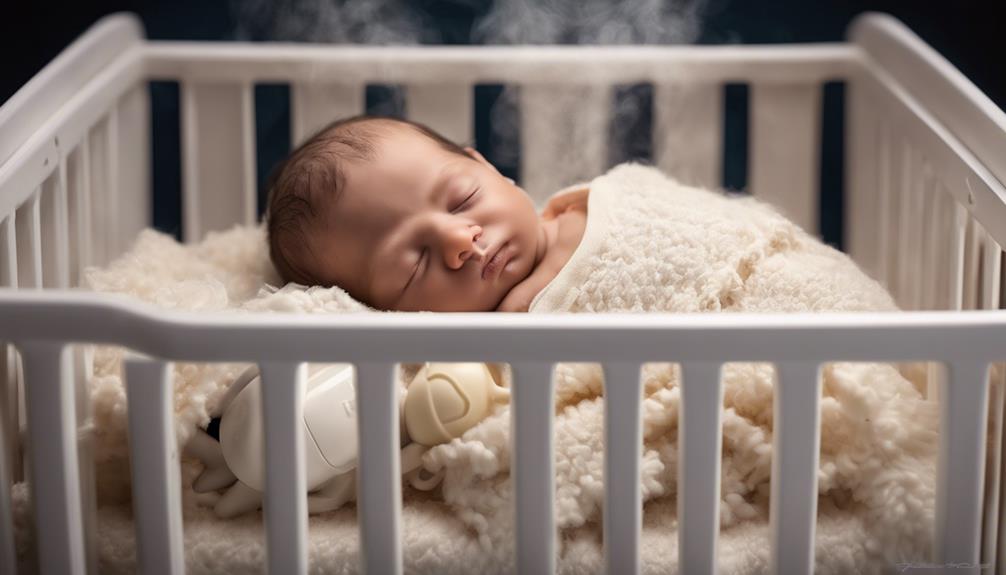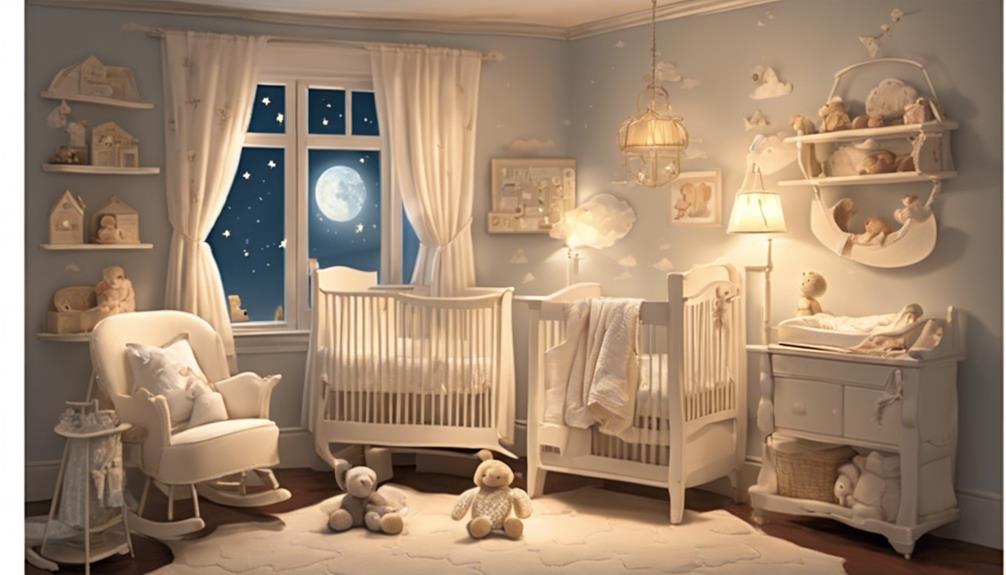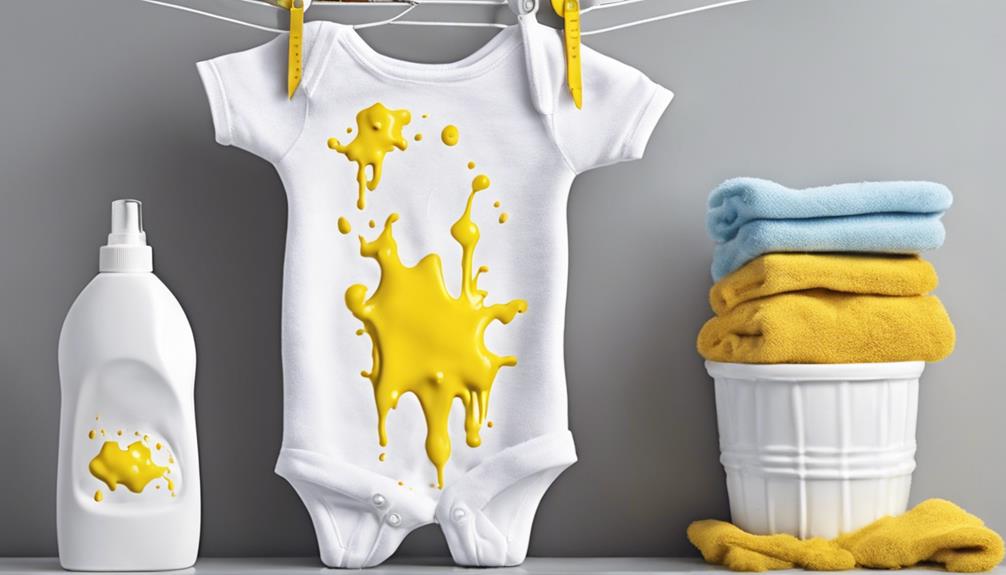Caring for a newborn can feel like navigating a maze of unexpected surprises, and when they are peacefully sleeping and a tiny cough interrupts, it can be worrisome.
But fear not, because we are here to shed light on the mysterious reasons behind why your newborn might be coughing in their slumber. From common colds to more serious conditions, understanding the root cause is essential in ensuring your little one's well-being.
So, let's uncover the ten possible culprits behind your newborn's nighttime coughing and explore how to address them effectively.
Key Takeaways
- Respiratory infections and allergies can cause nighttime coughing in newborns.
- Acid reflux and teething discomfort may also lead to coughing during sleep.
- Maintaining proper room humidity levels can help reduce coughing episodes.
- Asthma management and tailored medication plans are essential for cough-free sleep.
Respiratory Infections
Respiratory infections, such as bronchiolitis, RSV, or the common cold, can lead to newborns coughing in their sleep. These infections cause irritation and inflammation in the delicate airways of newborns, often resulting in the production of excess mucus. Due to their smaller airways, newborns are particularly vulnerable to respiratory infections, making coughing episodes during sleep more common.
When a newborn coughs in their sleep, it's usually their body's way of trying to clear the airways from mucus or other irritants. Monitoring these coughing episodes can provide valuable insights into the newborn's respiratory health. Frequent or persistent coughing during sleep could indicate a more severe respiratory issue that requires medical attention.
It is important to create a conducive sleep environment for newborns to minimize exposure to potential respiratory irritants. Keeping the sleeping area clean, maintaining best humidity levels, and avoiding exposure to cigarette smoke can help reduce the risk of respiratory infections and subsequent coughing episodes.
Allergies or Irritants

In our newborns, exposure to allergens or irritants in the environment can often trigger coughing episodes during sleep. Common culprits include dust, pet dander, pollen, smoke, or strong odors. It's not uncommon for newborns to experience sensitivity to these allergens, leading to nighttime coughing episodes. Along with coughing, symptoms like sneezing or watery eyes may also be present, indicating an allergic reaction. Identifying the specific triggers and taking steps to reduce your newborn's exposure to them can help alleviate the coughing episodes during sleep.
It can be distressing to see your newborn coughing in their sleep, but understanding the role of allergies or irritants can provide clarity. By creating a clean and allergen-free sleeping environment, you can help your little one breathe easier and sleep more peacefully. If you suspect that allergies or irritants are causing your newborn's cough, consider consulting a healthcare provider for further guidance on managing these triggers effectively.
Acid Reflux
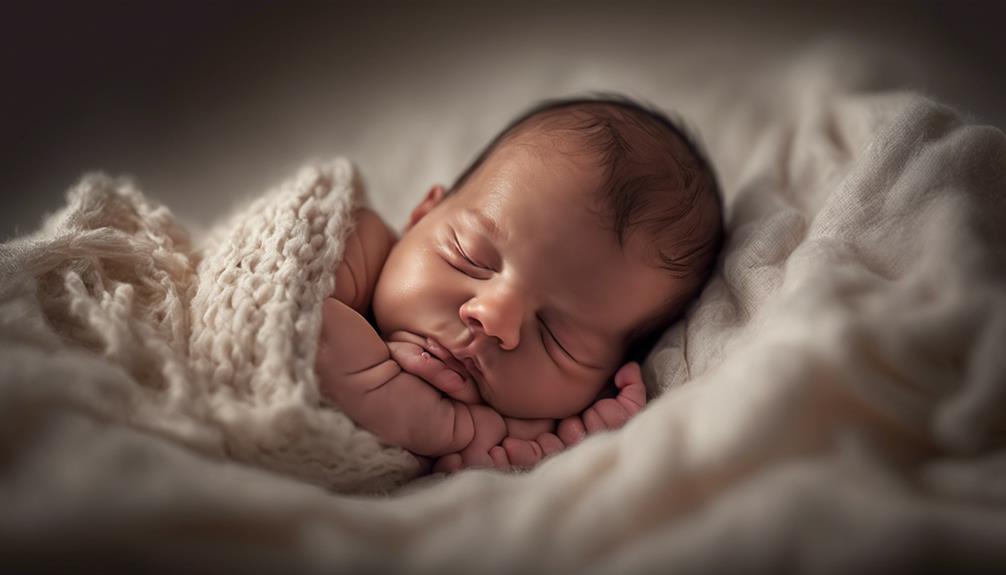
Experiencing acid reflux can lead to newborns coughing during sleep as stomach acid travels up the esophagus, causing discomfort and disrupting their rest. It's distressing to see our little ones struggle with this, but understanding the symptoms and ways to manage it can help provide relief:
- Regurgitation and Coughing: Newborns with acid reflux may frequently spit up and experience coughing episodes, especially when lying down for naps or bedtime.
- Behavioral Signs: Watch out for signs like irritability and arching of the back, which can indicate your baby is experiencing discomfort due to acid reflux during sleep.
- Management Strategies: Making feeding adjustments, using proper burping techniques, and keeping your baby upright after meals can help reduce the symptoms of acid reflux, improving their sleep quality and overall well-being.
Dry Air or Humidity

I comprehend how concerning it can be when your newborn is coughing in their sleep.
Dry air in the bedroom may be contributing to this issue by irritating their airways.
Adjusting the humidity levels in the room could help alleviate the discomfort your baby is experiencing.
Air Quality Impact
Maintaining ideal humidity levels in your newborn's nursery is essential for reducing nighttime coughing episodes caused by dry air irritation. Here are some key points to take into account:
- Dry Air Irritation: Dry air can irritate your baby's delicate airways, leading to nighttime coughing episodes.
- Low Humidity Effects: Insufficient moisture in the room can dry out your baby's throat, triggering nighttime coughing.
- Humidifier Solution: Using a humidifier in the nursery can help add moisture to the air, reducing the chances of nighttime coughing fits.
Humidity Levels Consideration
Dry air irritation can disrupt your newborn's sleep with nighttime coughing, highlighting the importance of considering humidity levels in the nursery. Newborns are especially sensitive to dry air, which can irritate their delicate airways, leading to coughing spells that disturb their rest.
Maintaining the humidity levels in the nursery between 40-60% is vital in alleviating nighttime coughing. Low humidity can dry out mucous membranes, exacerbating coughing, while high humidity can trigger allergies and coughing by fostering mold and dust mites.
Using a humidifier to regulate humidity levels can effectively prevent dry air-related coughing in newborns, ensuring a more peaceful and cough-free sleep for your little one.
Room Environment Adjustment
Ideal room environment adjustments, particularly in regulating humidity levels, play a key role in ensuring a restful and cough-free sleep for newborns. Here are some essential tips for adjusting the room environment to tackle nighttime coughing caused by dry air:
- Maintain Best Humidity Levels: Keep the room humidity levels between 40-60% to prevent airway irritation and soothe your newborn's cough.
- Use a Humidifier: Consider using a humidifier to add moisture to the air and reduce the risk of coughing due to dryness.
- Monitor Room Humidity: Regularly check and adjust the humidity levels in the room, especially during dry seasons, to alleviate respiratory issues and guarantee a comfortable sleep for your baby.
Teething Discomfort
During teething, newborns may experience discomfort that can lead to increased saliva production and nighttime coughing episodes. The process of teething often causes excessive drooling, which can trigger a coughing reflex in your little one, especially while they're asleep.
The increased saliva production during teething can sometimes result in your newborn swallowing more than usual, leading to brief coughing episodes during sleep. Additionally, teething can cause irritation in the throat and mouth, which may prompt a coughing response, even at night.
It's crucial for parents to recognize that teething discomfort is a common culprit for nighttime coughing in newborns. By understanding this connection, caregivers can address the issue with appropriate remedies to help alleviate the discomfort and ensure better sleep for their little one.
Respiratory Syncytial Virus (RSV)

Teething discomfort in newborns can sometimes lead to nighttime coughing, and one common respiratory concern during this time is Respiratory Syncytial Virus (RSV). RSV is a common respiratory virus that affects many newborns, causing symptoms like coughing, wheezing, and difficulty breathing.
Here are a few key points to help you understand RSV better:
- Highly Contagious: RSV spreads easily through respiratory droplets, so it's vital to practice good hygiene to prevent its transmission to newborns.
- Symptoms in Newborns: Watch out for signs like coughing, wheezing, and difficulty breathing, as these could indicate RSV infection.
- Potential Complications: In severe cases, RSV can lead to pneumonia or bronchiolitis in newborns, highlighting the importance of seeking medical attention if your baby shows concerning symptoms.
If you notice your newborn experiencing persistent coughing, wheezing, or breathing difficulties, it's important to consult a healthcare provider for proper evaluation and management.
Asthma
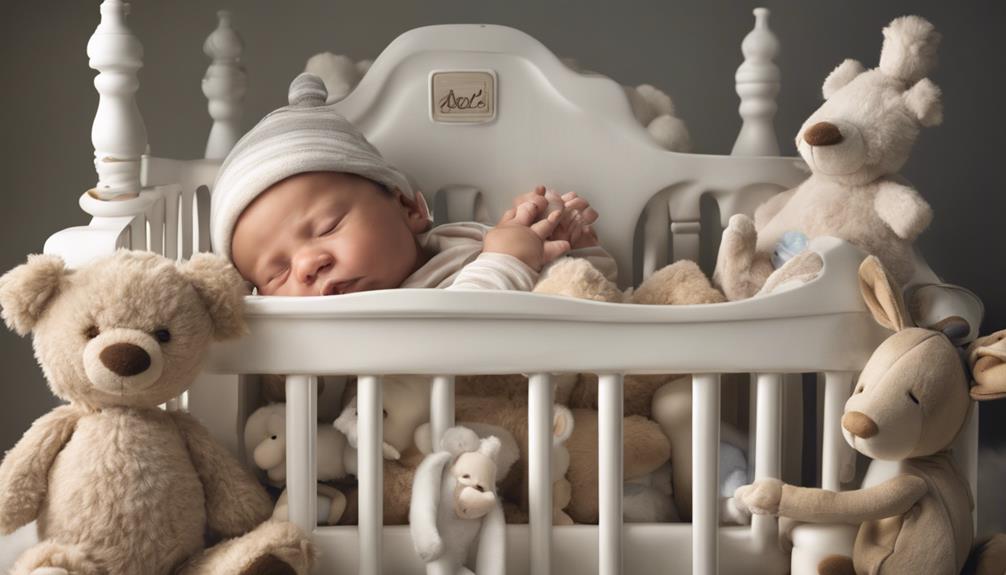
As we explore asthma in newborns, it's important to understand the triggers that can worsen symptoms, especially at night. Factors like allergens, cold air, or irritants can impact a baby's breathing during sleep.
Developing a tailored medication plan and monitoring the baby's sleep position can help manage asthma effectively.
Asthma Triggers at Night
Nighttime asthma triggers can exacerbate symptoms such as coughing in newborns, often due to environmental factors like temperature changes and allergen exposure. When managing asthma in newborns at night, it's important to take note of the following:
- Maintain a Consistent Sleep Environment: Keep the room temperature stable and free from irritants like dust mites or pet dander.
- Use Dust Mite-Proof Bedding: Invest in allergen-proof covers for pillows and mattresses to reduce exposure to dust mites.
- Regularly Clean Air Filters: Make sure air filters are cleaned or replaced regularly to minimize airborne allergens that can trigger asthma symptoms.
Sleep Position Impact
Managing the challenges of managing asthma in newborns includes considering the impact of sleep positions on their nighttime coughing episodes. Babies with asthma may experience increased nighttime coughing due to post-nasal drip and airway inflammation worsened by lying flat. Elevating the head of the crib or bed slightly can help improve breathing and reduce these coughing episodes. This small adjustment can make a significant difference in your baby's quality of sleep and overall well-being. Here is a table summarizing the impact of sleep positions on nighttime coughing in babies with asthma:
| Sleep Position | Impact on Nighttime Coughing |
|---|---|
| Supine (on the back) | Can worsen coughing episodes |
| Elevated head position | Helps improve breathing and reduce coughing |
Being aware of how sleep positions affect your baby's asthma can lead to better management strategies and improved rest for both you and your little one.
Medication Management Strategies
When managing asthma in newborns, it's important to understand and implement effective medication management strategies to control symptoms and improve their quality of life. Here are some key points to take into account:
- Controller Medications: These are essential for daily use to prevent asthma symptoms and decrease the reliance on quick-relief medications.
- Quick-Relief Medications: Quick-relief medications like albuterol provide immediate relief during asthma attacks or flare-ups and should be used as directed.
- Inhaled Corticosteroids: These medications help reduce inflammation in the airways and are commonly prescribed to manage child asthma.
Foreign Object Inhalation

In cases of foreign object inhalation, newborns may experience coughing episodes during sleep, necessitating immediate attention to prevent potential airway blockage and guarantee respiratory health. It is essential to act promptly if you suspect your newborn has inhaled a foreign object to avoid serious complications. Here are some symptoms to look out for:
| Symptom | Description | Action Needed |
|---|---|---|
| Persistent Cough | Continuous coughing, especially during sleep | Seek Medical Help |
| Wheezing | Whistling sound while breathing | Contact Healthcare Provider |
| Gasping for Breath | Difficulty breathing, rapid inhalation | Seek Emergency Care |
If you notice any of these signs in your newborn, seek immediate medical attention. Remember, a quick response can make all the difference in ensuring your baby's well-being.
Postnasal Drip

Here are the POINTS we'll be covering regarding postnasal drip in newborns:
- Understanding the causes behind this common occurrence.
- Recognizing the symptoms that may indicate postnasal drip.
- Exploring the various treatment options available to alleviate discomfort.
Let's explore into each of these aspects to equip you with the knowledge needed to address your newborn's coughing during sleep effectively.
Causes of Postnasal Drip
Excess mucus dripping down the back of the throat is a common culprit behind postnasal drip in newborns, often resulting in nighttime coughing episodes. When addressing the causes of postnasal drip in newborns, consider the following:
- Allergies: Newborns can experience postnasal drip due to allergic reactions to common triggers like dust, pet dander, or pollen.
- Infections: Sinus infections or colds can lead to increased mucus production, contributing to postnasal drip in newborns.
- Environmental Irritants: Exposure to smoke, strong odors, or pollution can irritate the nasal passages, leading to postnasal drip in newborns.
Understanding these causes can help parents take proactive steps to alleviate postnasal drip in their newborns, such as using saline nasal drops.
Symptoms to Watch
Exploring the symptoms of postnasal drip in newborns can be concerning for parents, especially when observing a wet, productive cough during their sleep. In addition to the distinctive cough, newborns with postnasal drip may exhibit signs such as a runny or stuffy nose, frequent throat clearing, and occasional irritability. These symptoms can lead to difficulty breathing, which can further disrupt their sleep patterns.
It's essential for parents to pay close attention to these signs to guarantee early detection and appropriate treatment. Postnasal drip in newborns can be triggered by various factors like allergies, colds, sinus infections, or exposure to environmental irritants. Understanding these symptoms can help parents seek timely medical advice and consider interventions such as using a cool-mist humidifier and saline nasal drops to alleviate their newborn's discomfort.
Treatment Options Available
When addressing postnasal drip in newborns, various treatment options are available to contemplate alleviating symptoms and promote comfort. Here are some approaches to contemplate:
- Saline Nasal Sprays: Gentle saline sprays can help loosen and clear mucus from your baby's nasal passages, reducing postnasal drip.
- Antihistamines: In cases where allergies are the cause of postnasal drip, pediatricians may recommend antihistamines to manage symptoms and decrease mucus production.
- Humidifier: Using a humidifier in your baby's room can add moisture to the air, helping to soothe irritated nasal passages and reduce coughing episodes.
Environmental Triggers
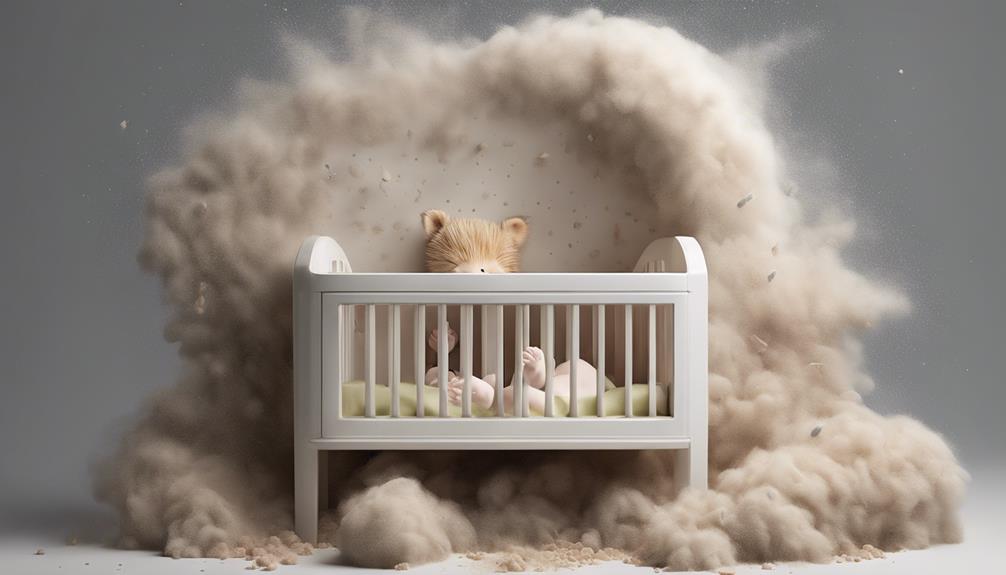
In considering environmental triggers, it's essential to be mindful of potential irritants that can affect a newborn's airways during sleep. Nighttime coughing in newborns can be exacerbated by common indoor allergens like dust, pet dander, and tobacco smoke. Additionally, factors such as mold, pollen, and dust mites present in the sleep environment may contribute to these coughing episodes.
Ensuring good air quality in the nursery is vital, as poor air circulation and dry air can also lead to increased coughing while the baby sleeps. Strong odors from perfumes, cleaning products, or cooking fumes should be avoided as they can provoke coughing in newborns.
To help alleviate nighttime coughing, it's important to keep the newborn's sleep environment clean, well-ventilated, and free from potential irritants. By taking these steps, parents can create a more comfortable and healthy sleeping space for their little ones.
Frequently Asked Questions
Is It Normal for Newborn to Cough While Sleeping?
Yes, it's normal for newborns to cough while sleeping. Their developing respiratory systems may clear mucus or react to environmental factors. Monitoring cough frequency is key. However, severe or persistent coughs warrant evaluation for underlying issues.
When Should You Worry About a Newborns Cough?
If your newborn's cough persists, worsens, or is accompanied by other symptoms like fever or difficulty feeding, consult a healthcare provider promptly. Any concerns about your baby's cough should not be neglected to guarantee their well-being.
Why Is My Newborn Choking and Coughing in His Sleep?
I comprehend the concern when your newborn chokes or coughs in sleep. It could be due to reflux, immature gag reflex, airway anatomy, nasal congestion, or medical conditions. Always consult a healthcare provider for guidance and reassurance.
How Do I Stop My Baby From Coughing in His Sleep?
We comprehend the worry of hearing your newborn cough in sleep. Elevating the crib, using a humidifier, maintaining proper room conditions, hydration, and reducing irritants can help. Let's make sure your baby sleeps peacefully.
Can Medical Surveillance in the Workplace Identify and Address Health Issues in Newborns?
Medical surveillance in the workplace cannot identify and address health issues in newborns. This type of surveillance is limited to the employees working in a specific environment. However, regular medical check-ups and screenings for newborns can help identify and address any potential health issues early on.
Conclusion
To sum up, steering your newborn's nighttime coughing can feel like sailing through a stormy sea. By understanding the various causes and implementing appropriate management strategies, you can help your little one find relief and sleep soundly.
Remember, seeking medical advice when needed is like a guiding lighthouse in the darkness, ensuring your baby's health and well-being. Stay vigilant, stay informed, and weather the coughing storms with care and confidence.
